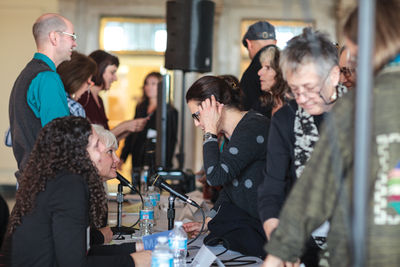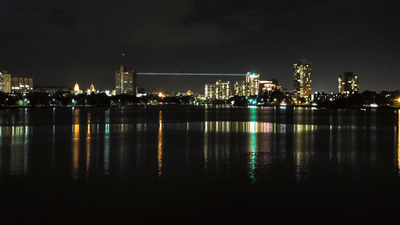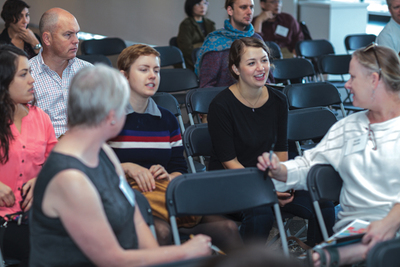TransCultural Exchange

Networking following a conference panel. Photo: Don Motheman.
This February, a diverse gathering of more than 400 artists from around the world will brave Boston’s winter weather to convene for the fifth annual TransCultural Exchange Conference (TCE). Drawn together to explore synergies, collaborations and connections, attendees will include artists, artist-in-residency directors, critics, curators, engineers, gallery dealers, and scientists from more than 40 countries. Equal parts laboratory, think tank, marketplace and schmooze-fest, TCE has a devoted and growing following of artists from a range of disciplines seeking to expand their horizons creatively and professionally.
“TCE is a sort of quiet cultural Davos—free range, open, exploratory,” said Thaddeus Beal, a Boston painter. “The difference is the posturing inherent in Davos. The art world is also infamous for that kind of posing, fancy clothes, slick salesmanship and incomprehensible rhetoric.”
“But the first time I went to a TCE conference, I was instantly struck by its atmosphere—palpably relaxed and supportive without fuss, without posturing, without tail feathers, without backbiting,” he continued. “The atmosphere is collegial, not competitive. Openly curious, not guarded or protective. It’s about skills, about work behind art, about trends, about other cultures.”
TCE will offer a variety of activities including keynote talks, portfolio reviews, informal gatherings, evening receptions, PechaKucha presentations, panel discussions, and concerts. Panelists will speak about their international residency programs, provide practical advice on topics such as resources for funding and managing a studio practice, explore the role of art in social interventions and promote possibilities for artists to collaborate.
Speakers range from high-profile international curators Ute Meta Bauer and Sarah Tanguy from the Art in Embassies program; to Damian Hebron, director of London Arts in Health Forum; Doris Sommer, director of Harvard University’s Cultural Agents; and Andy Riess, assistant director for outreach for the Fulbright Scholar Program.
Boston University is TCE’s 2016 lead academic host, and most of the panels will take place at its George Sherman Union. Attendant activities will also be offered at the Massachusetts Institute of Technology, Harvard University Art Museum’s Study Center, Emerson College, the Massachusetts College of Art + Design, the French Cultural Center and Goethe-Institut.

Florian Dombois, uboc No.1 & stuVi2, a blue-green laser shot over half a mile between Boston University’s new student dorm (StuVi2) and its School of Law from October 10–12, 2013. The work acted as a metaphor for TransCultural Exchange’s 2013 Conference on International Opportunities in the Arts. Photo: Florian Dombois.
“TransCultural Exchange gives artists access to a world of possibilities that often seem out of reach,” said Caitlin Strokosch, executive director of Alliance of Artists Communities. “The conference offers clear, direct engagement with individuals who have opportunities and resources to offer artists, and it does so in a context that is both focused on the practical needs of artists as well as the critical issues the arts are addressing in the world today.”
Jeanne Landry-Belleau, a Quebec artist and self-described humanist, enthusiastically affirms that participation in the last two TCE conferences has not only provided her with many professional opportunities she had
never imagined, but also inspired an artistic breakthrough.
“While attending the 2009 conference, the Haslla Art World presentation touched me in a specific way,” she recalled. “This organization seemed closely related to my art vision. I introduced myself and my work to Haslla’s directors after their panel. We exchanged ideas about art and community. I really connected with them and their vision of art democratization.”
A few weeks after the conference, Haslla invited Landry-Belleau to their symposium and a two-week residency in South Korea.

Informal networking at the conference. Photo: William Morse.
“Participating in the symposium pushed my career further,” she said. “My artwork became stronger and more engaged. Haslla inspired me to show my ongoing project Chrysalide Humaine, a human values collection, and develop my Master research, a project which is a synthesis of the Web and humanism from the Renaissance.”
Rudi Punzo of Turin, Italy, found TCE to be an innovation incubator that mixes technology and art. “As part of TCE, I experienced a parallel reality at the famous Nexus Machine Shop and Gallery in South Boston, a pool of engineers engaged in many projects,” Punzo recalled. “The atmosphere was creatively stimulating and the people were both genial and geniuses. I had breakfast with people from MIT talking about some future app while studying the best way to cook pancakes without a frying pan—amidst puzzled-looking cats, books and obsolete computer parts.”
The intersection of art and science that occurs at TCE spurred the involvement of swissnex Boston, an initiative devoted to connecting Switzerland and North America in science, education, art, and innovation.
“With very broad interest in the fields of art, culture, and technology, TCE serves as a perfect platform to bring Swiss researchers and artists together with such persons from around the globe,” observed Andreas Rufer, deputy consul, Consulate of Switzerland. “The trend of melding art and science is growing and TCE had clearly a very high interest in projects which cross-pollinate the two disciplines.”
TransCultural Exchange was founded in Chicago in 1989 by director Mary Sherman. An artist and curator, she also teaches at Boston College, Northeastern University and recently served as the interim associate director of MIT’s Program in Art, Culture and Technology.
“I’ve been so impressed by the work of Mary Sherman and what she has accomplished with TransCultural Exchange in Boston,” said Julie S. Burros, Chief of Arts and Culture, City of Boston. “This is an incredible gathering of local and international artists and people engaged in creative practice of many different kinds. It’s an opportune time to consider the role of ‘opportunity’ in Boston, as we are in the middle of developing the first-ever cultural plan for the city: Boston Creates. We have the opportunity to elevate the arts and the role of the artist and put into place the resources to help Boston become a municipal arts leader.”
Meg Pier is a writer, photographer and personal historian. She is a frequent contributor to the Boston Globe and Huffington Post. Meg chronicles her explorations on her blog View from the Pier.
